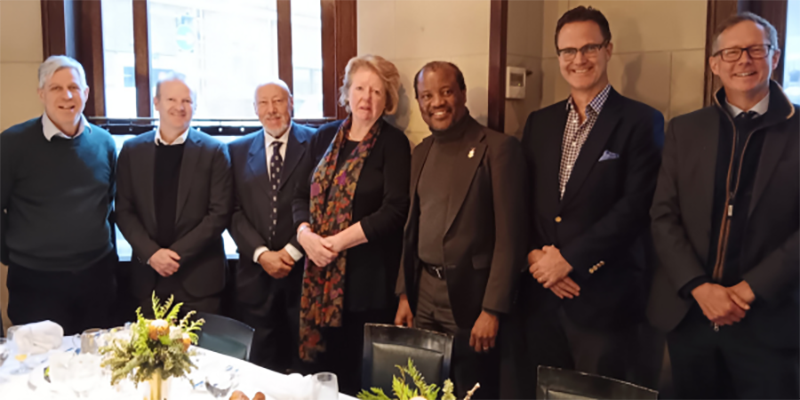Climbing the mining-and-finance ladder to the top
- Wits University
Dr Fiona Perrott-Humphrey’s current jobs in London are a far cry from her early career as a teacher in rural KwaZulu-Natal.

From Left to Right: Prof Richard Bradley, Anton Ossip, Dr Allen Zimbler, Dr Fiona Perrot-Humphrey,
Prof Zeblon Vilakazi, Philip Lindop, and Mark Byrne.
Dr Fiona Perrott-Humphrey’s current jobs in London — one as Senior Adviser on Mining Investments to Rothschild & Co. and the other as Director of the London-Stock-Exchanged-listed Baker Steel Resources Trust, that invests in unquoted mining projects which are brought on to maturity — are a far cry from her early career as a teacher in rural KwaZulu-Natal.
Born in Johannesburg, Fiona completed a BA in English and History in Pietermaritzburg at the University of Natal, followed by a teacher training course at UCT.
“In those days the education department would fund your studies if you repaid them by working for them for three years,” she recalls.
Having worked the requisite three years in fairly remote rural areas, it was time to return to the lure of eGoli for a change of career focus. Perrott-Humphrey chose to do an MBA at the Wits Business School because “the Wits MBA was 18 months and considered to be more academic than the UCT one which was a year, so that attracted me, and of course Johannesburg was the centre of finance and industry. When I later went to lecture in Pietermaritzburg and tried to forge links for my students in the business community, there were only small businesses, whereas Joburg is in the centre of everything,” she says. “My switching to finance was all thanks to the Wits Business School. The lecturers were consulting out in the business world as well as teaching, so you felt like you were in the real world and not in an academic ivory tower.”
The programme also took her out of her natural comfort zone. “An MBA is a team thing, which was interesting for me because even now, in my analyst career, it’s a single-person type of environment, so I found it quite odd to be on a team but that was one of the strengths of the Wits MBA.”
While becoming rooted in the financial world, she also became interested in mining and labour, completing a doctorate on training small black businesses that had been shut out by the apartheid system.
Perrott-Humphrey’s links with Wits have continued in the area of consulting and advice. She would like to encourage the establishment of a mining and business module. “I think mining should be more actively linked to the business school in its bid to be the best business school in Africa.”
Her advisory capacity has extended into monetising the research conducted in universities.
“As universities need to fund more of their own expenses, this monetising of research excellence is a must. We’ve had a few conversations with Wits and that’s where I feel I can give back and help. We’ve never seen a time, because of the energy transition, that is so ripe for new tech ideas,” she adds.
Being one of the few women in a senior mining analyst position, Perrott-Humphrey is frequently asked to speak to those looking to further their careers. “Young women, who are so much more driven and focused these days, will say: ‘Tell us how to get from where we are now to where you are.’ And I say, ’It was seriously a random walk’.”

